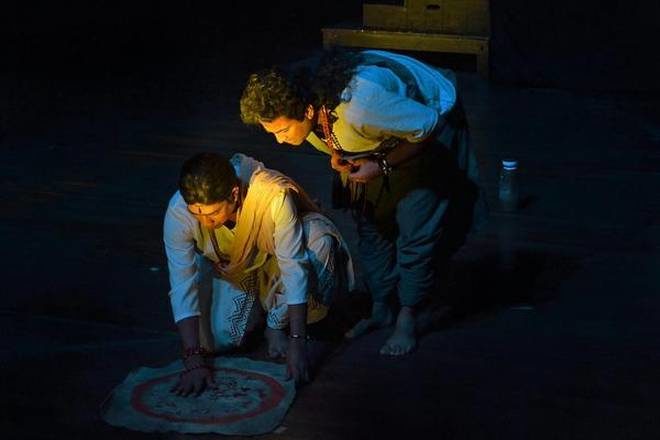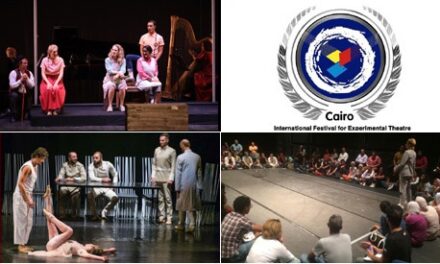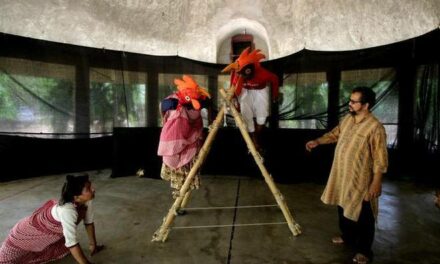Starting today, the 13th edition of META Festival brings to theatre lovers diverse plays from all corners of the country.
Delhi’s theatre circuit is fully charged these days. Even as the 8th Theatre Olympics comes to a close, the curtain rises on the 13th edition of the Mahindra Excellence in Theatre Awards Festival. Spread over six days, the festival will showcase ten plays chosen from around 350 entries.
“After more than a decade, META has carved a niche for itself. This can be attributed to the quality of plays that the festival stages. This time too, we received entries from all over the country, including smaller metros and towns, of which 10 were chosen by a selection committee. The fact that entries were received from four corners speaks of the value attached to the festival by theatre persons,” observes Jay Mehta, Head, Cultural Outreach, Mahindra & Mahindra Ltd.
Well-known director and actor Swaroopa Ghosh, who is part of the selection committee describes the bouquet “diverse in terms of the region as well as their subjects.”
She adds, “These explore varied and wide-ranging subjects like gender identity through Indian mythology, entertainment industry and its treatment of female leads, politics of religion and religion of politics, brutality against women by Japanese imperialist forces during World War II and reinterpretation of a Greek tragedy.”
Talking about the “tough process” of selecting 10 plays, Swaroopa informs,
“Each of us watched a certain number of DVDs to grade them. Thereafter, we all met to watch all the plays and deliberated on each with every individual furnishing logic and rationale of his/her choice. Through continuous discussion and dialogue, we arrived at a consensus.”
The plays which will vie for 13 awards in 13 competitive categories are Hojang Taret (Manipuri), Item and Muktidham (both Hindi), Karuppu (non-verbal), Caucasian Chalk Circle (Kannada), Comfort Women–An Untold History(Assamese), Nona and Higuita–The Goalie’s Anxiety At The Penalty Kick (both Malayalam), Moimonsingha Geetika (Bangala) and Shikhandi: The Story of the In-betweens (English). These will be staged at Shri Ram Centre, Kamani Auditorium, and Shriram Bharatiya Kala Kendra.
Swaroopa says the choice was not based on a single parameter.
“It was on the basis of ensemble, presentation, production values, and content. A play may have been tacky or grand but lacked meat while others fell short on script, design, and acting.”
To highlight her point she cites the example of Moimonsingha Geetika and Higuita…
“I had seen a different version of Geetika and wondered how Goutam Haldar would handle it. He treated it differently by including new designs and music. Likewise, the Malayalam play directed by Sasidharan Naduvil and based on N.S. Madhavan’s story about a Christian priest drawing inspiration from Colombian goalkeeper Jose Rene Higuita Zapata was nail-biting, reflecting a certain spunk.”
According to Swaroopa, what was essential for selection of plays was the need to be contextual.
“In order to strike a chord with the audience, a play ought to reflect life and times while providing a perspective on issues. Going beyond entertainment, theatre should set in motion conversation and curiosity.”
This holds true for all the 10 plays. Ranhang Choudhary’s Comfort Women… set in World War II, talks about women forcibly abducted for sex by the Japanese Imperialist Army.
“Deeply moved by their plight and struggle for dignity, I wrote the script revolving around a tribal girl Sarengla located in Indo-Burma border who is kidnapped for prostitution,” says Ranhang.
For background, Ranhang says, he interviewed several people, read all the material available on the subject, including Yaruingam by Birendra Kumar Bhattacharya.
“What amazes me is that even after the passage of so many years, the status of women has not changed either in India or world. They are humiliated, tortured, and never allowed to return to mainstream as evident from the suffering of rape victims.”
Ranhang chose Gargee Dutta as Sarengla, the main protagonist.
“She along with others underwent three months of physical and mental training watching several documentaries on ‘comfort women.’ Gargee met a psychologist to understand the trauma a physically abused woman suffers, to make her portrayal authentic.”
Another play which deals with gender disparity is Item in Hindi. Directed by Kshitish Date and written by Siddhesh Purkar, it explores the underbelly of Hindi cinema looking at B-grade film world through a lightman and an actor Sapna Shetty.
“While exposing the objectification of female body and male chauvinistic media, the narrative of Item deals with power structure and standardization of color, shape, and pose for women,” reveals Kshitish.
What is remarkable in the play is the use of bed with camera, plot, dilapidated lights, dirty props, polished chairs, and actors, revolving around it.
Faezeh Jalali’s Shikhandi is back to the Capital after having been staged at the Olympics.
Pleased to be nominated for META, Faezeh says, “Having encountered gender discrimination first hand, I could empathize with transgenders going through the struggle of identity and finding a voice. Enamoured of Shikhandi’s character in Mahabharat, I wrote the script to highlight these points.”
The opening play, Muktidham, written and directed by Abhishek Majumdar, draws attention to the growing religious intolerance by reflecting on history. Set in 8th Century AD Matha (Hindu monastery), its backdrop is the period when the Buddhist Pala kings dominated northern and eastern India and mass conversions to Buddhism was widespread. The two protagonists, in the race to head the Matha, hold diverse views. Believing in reform, one wants to open temple doors to lower castes while the other views armed resistance to Buddhism as the solution.
“Muktidham highlights that threat to one’s identity as is perceived by certain sections of Hindus is nothing new. We have faced it in past, and survived as we will now.”
Faced with funding problems because of its sensitive topic, Abhishek is, however, happy with the reception the play received so far.
“We staged it recently in Uttar Pradesh in cities like Gorakhpur. Instead of resistance, the play, generated conversation and debate.”
This year META will confer the Lifetime Achievement Award on noted Indian film and theatre director Vijaya Mehta. In a first, it will also hold a series of master classes, curated in partnership with Drama School Mumbai.
“This new initiative—workshops and conversations around theatre-making—will give an insight into the people and processes behind plays that make it to META,” states Jay.
This article originally appeared in The Hindu on April 13, 2018, and has been reposted with permission.
This post was written by the author in their personal capacity.The opinions expressed in this article are the author’s own and do not reflect the view of The Theatre Times, their staff or collaborators.
This post was written by S. Ravi.
The views expressed here belong to the author and do not necessarily reflect our views and opinions.


















